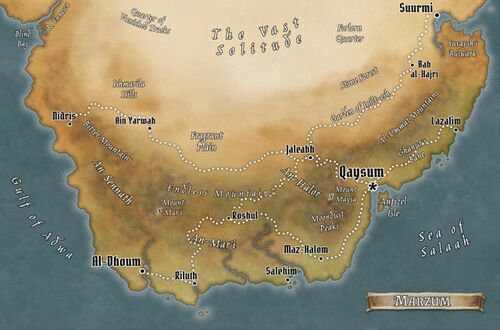Difference between revisions of "Marzum"
| Line 35: | Line 35: | ||
==Economy== | ==Economy== | ||
Much of Marzum's economy is centered around its trade in precious luxury goods, chiefly incense and gems. Aromatic resin from the [[torchwood]] trees is harvested in the dry northern hills of the province, furnishing frankincense and myrrh, while the [[ishmarila]] of the coastal cliffs similarly offer its ruby-red sap for both incense and perfume. The lovely violet-red [[marzite]], found almost exclusively in the Endless Mountains, is not only used in jewelry, but is often crushed to form a glistening powder that has the power to neutralize poisons. Other precious materials of the province include [[maysali quartz]], [[dragonblood]], [[treestone]], and [[celeirite]]. | |||
More pragmatically, the pine and cedar clad slopes of the mountains are a source of timber and tar for the ships of the caliphate, as well as lumber for buildings and furniture. Fruit from the coastal plains includes lemons and limes, lusks, dates and figs, and numerous types of melon, which may be consumed as they are or used to make a variety of candies, cordials, and pastries. Pistachios and honey are also harvested here, leading to Marzum's reputation for some of the best baklava in the caliphate. | |||
A less tangible component of the province's economy is its role as a destination of pilgrims and curious travelers, who come from near and far to visit its many sites of religious importance and historical interest. | |||
==Religion== | ==Religion== | ||
| Line 40: | Line 46: | ||
==Cities & Towns== | ==Cities & Towns== | ||
* '''[[Qaysum]]''' | * '''[[Qaysum]]''', "the world's bazaar", an ancient port on the Sea of Salaah. | ||
* '''[[Ain Yarwah]]''' | * '''[[Ain Yarwah]]''' | ||
* '''[[al-Dhoum]]''' | * '''[[al-Dhoum]]''' | ||
Revision as of 18:00, 1 November 2023
| Allegiance | Sirdabi Caliphate |
| Capital | Qaysum |
| Governor | Hanbal ibn Shahnour |
| Demonym | Marzumite |
| Official Language | Sirdabi |
| Official Religion | Azadi |
| Currency | fals/dirham/nour |
| Native Heritages | Sirdabi |
The province of Marzum is a mountainous strip of land south of Rahoum, a place whose rich history far surpasses the narrow borders of its coastal plain. Grain and fruit abound in that slender strip of fertile ground, while the great incense routes wind through the hills and valleys bringing exotic scents to the great port of Qaysum and the lands of the Sea of Salaah that washes the province's shores. Proud of their storied past, yet deeply invested in the present prosperity of the Sirdabi Caliphate, the people of Marzum cherish the famous sites from their history while pursuing new opportunities in commerce and foreign relations.
Geography & Climate
People
Economy
Much of Marzum's economy is centered around its trade in precious luxury goods, chiefly incense and gems. Aromatic resin from the torchwood trees is harvested in the dry northern hills of the province, furnishing frankincense and myrrh, while the ishmarila of the coastal cliffs similarly offer its ruby-red sap for both incense and perfume. The lovely violet-red marzite, found almost exclusively in the Endless Mountains, is not only used in jewelry, but is often crushed to form a glistening powder that has the power to neutralize poisons. Other precious materials of the province include maysali quartz, dragonblood, treestone, and celeirite.
More pragmatically, the pine and cedar clad slopes of the mountains are a source of timber and tar for the ships of the caliphate, as well as lumber for buildings and furniture. Fruit from the coastal plains includes lemons and limes, lusks, dates and figs, and numerous types of melon, which may be consumed as they are or used to make a variety of candies, cordials, and pastries. Pistachios and honey are also harvested here, leading to Marzum's reputation for some of the best baklava in the caliphate.
A less tangible component of the province's economy is its role as a destination of pilgrims and curious travelers, who come from near and far to visit its many sites of religious importance and historical interest.
Religion
Cities & Towns
- Qaysum, "the world's bazaar", an ancient port on the Sea of Salaah.
- Ain Yarwah
- al-Dhoum
- Bab al-Hajri
- Jaleabh
- Lazalim
- Maz-Halom
- Nidris
- Riluth
- Roshul
- Salehim
